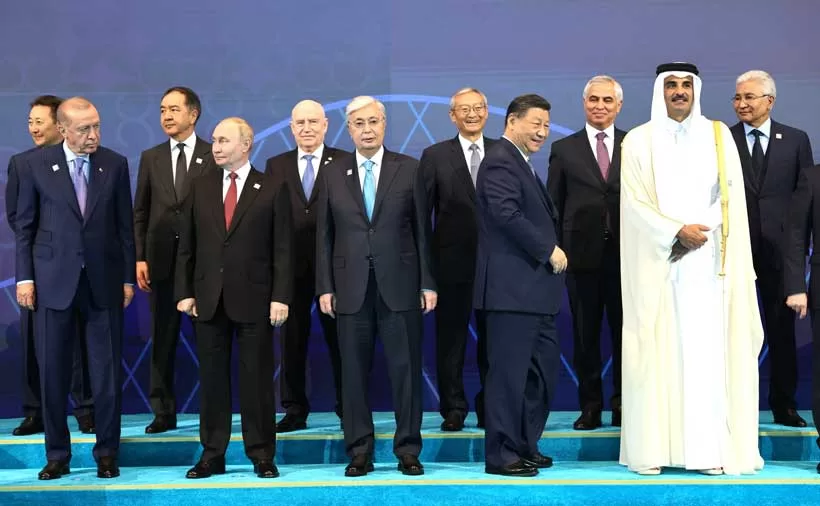“We want to further develop our relations with Russia and China within the Shanghai Cooperation Organization. We believe they should accept us not just as a dialogue partner but as a member like the others”. –President Recep Tayyip Erdogan
In a surprising move that has caused a stir across the geopolitical landscape, Türkiye has shown interest in becoming a full member of the Shanghai Cooperation Organization (SCO). This development carries significant implications for regional security and economic dynamics, especially considering Türkiye’s long-standing membership in NATO. This article explores the multifaceted aspects of Türkiye’s potential SCO membership and its ramifications for the country’s position on the global stage.
Regional Security Dimension
Türkiye’s potential full membership in the SCO presents a complex scenario in terms of regional security, given its existing NATO commitments:
- NATO-SCO Balance: Türkiye has been a NATO member since 1952, forming a crucial part of the alliance’s southeastern flank. Its potential SCO membership could create tensions within NATO, as the SCO is often perceived as a counterweight to Western-led security structures. Türkiye would need to carefully navigate its commitments to both organizations to avoid conflicts of interest.
- Strategic Flexibility: By aligning with both NATO and the SCO, Türkiye could position itself as a unique bridge between Eastern and Western security frameworks. This dual membership could potentially allow Türkiye to mediate conflicts and tensions between the two blocs.
- Black Sea and Middle East Security: Türkiye’s geographical position makes it a key player in both Black Sea and Middle East security. SCO membership could enhance Türkiye’s ability to cooperate with Russia and Central Asian states on regional security issues, potentially leading to more comprehensive approaches to challenges like terrorism and border security.
- Intelligence Sharing Concerns: NATO allies might express reservations about Türkiye’s access to sensitive alliance information if it also becomes privy to SCO intelligence. This could lead to restrictions on Türkiye’s participation in certain NATO operations or information-sharing protocols.
Economic Dimension
The economic aspects of Türkiye’s potential SCO membership are equally significant:
- Trade Expansion: Full membership in the SCO could open up new trade routes and markets for Türkiye, particularly in Central Asia and with economic powerhouses like China and India. This could help diversify Türkiye’s economic partnerships beyond its traditional Western allies.
- Belt and Road Initiative (BRI) Integration: Türkiye’s strategic location makes it a crucial link in China’s Belt and Road Initiative. SCO membership could facilitate greater Turkish participation in BRI projects, potentially bringing significant infrastructure investments.
- Energy Cooperation: The SCO includes major energy producers like Russia and Kazakhstan. Membership could enhance Türkiye’s role as an energy hub, potentially leading to new pipeline projects and energy deals.
- Currency Diversification: SCO countries have been exploring alternatives to dollar-denominated trade. Türkiye, which has faced currency volatility, might benefit from participating in these initiatives, potentially reducing its dependence on Western financial systems.
- Technology Transfer: Closer ties with SCO members, particularly China, could facilitate technology transfer in sectors like telecommunications, artificial intelligence, and defense industries.
Challenges and Considerations
Türkiye’s pursuit of SCO membership while maintaining its NATO alliance presents several challenges:
- Balancing Act: Türkiye will need to carefully balance its commitments and relationships to avoid alienating either its Western allies or its new Eastern partners.
- Sovereignty Concerns: Some critics argue that deeper involvement with the SCO could compromise Türkiye’s sovereignty, particularly given the organization’s reputation for supporting authoritarian governance models.
- Human Rights and Democracy: Türkiye’s potential closer alignment with SCO members might face criticism from Western allies concerned about human rights and democratic backsliding.
- Economic Dependency: While SCO membership offers economic opportunities, it also risks creating new dependencies, particularly with China, which could limit Türkiye’s future policy options.
Türkiye’s potential full membership in the SCO represents a bold geopolitical move that could reshape regional dynamics. Türkiye aims to maximize its strategic importance and economic opportunities by straddling Eastern and Western security and economic structures. However, this balancing act between NATO and the SCO will require careful diplomacy and strategic foresight to navigate the complex web of international relations and avoid potential pitfalls. As Türkiye moves forward with its SCO ambitions, the international community will be watching closely to see how this unique position influences regional security, economic cooperation, and the broader balance of power between East and West.
